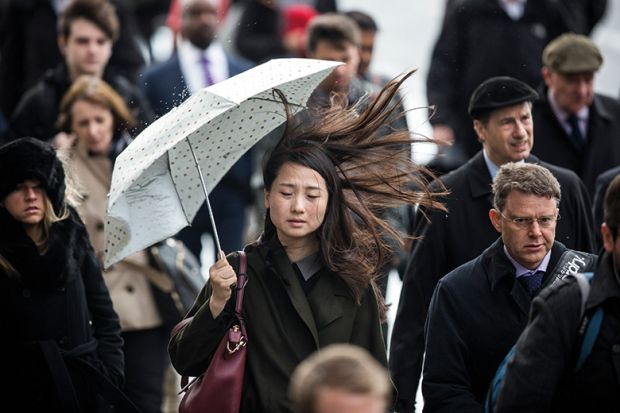Chinese graduates of UK universities can find themselves caught in a “paradox” of having to demonstrate how their overseas experience makes them “stand out” while also proving they can “fit back in” to the culture of their homeland, according to new research.
A study conducted by researchers at the University of Warwick found that Chinese employers increasingly perceive an overseas education to be “normal” and that students need to differentiate themselves and “sell their experience” when applying for jobs in China.
On the other hand, employers also expressed the need for graduates to “adapt back and ‘fit in’ to the Chinese working culture” after studying overseas, according to the report, Standing Out and Fitting In: The Paradox for UK-Educated Chinese Students, which will be launched in Beijing this month.
The findings were based on quantitative and qualitative interviews with almost 100 Chinese employers from a variety of companies, including start-ups, multinationals, government organisations and state-owned enterprises.
Some of the employers also perceived UK-educated Chinese students to be more likely to have “over-inflated expected starting salaries”, according to the report.
Esther de Perlaky, international employer liaison manager at Warwick, said that while employers wanted students to “sell the benefits of their experience in the UK”, Chinese students tended to perceive that their overseas education was “enough of a unique selling point” when applying for jobs.
She said UK universities needed to “equip [Chinese] students with the skills and abilities to be able to sell that experience”, so that they do not just cite the university’s name on an application form.
Lawrence Young, a pro vice-chancellor at Warwick, added that UK universities often expect Chinese students to “rapidly adapt to Western modes of learning” and academic culture, such as questioning scholars, and then Chinese employers expect the same students to assimilate back into the “very conservative” and “instructive” Chinese culture once they graduate.
He said UK universities could “better engage with employers in China” to help students make this transition.
A survey of 2,174 UK-based Chinese students from 54 universities, which was conducted as part of the same research project, found that just one-quarter have a clear future career aim and almost half (47 per cent) had not used their university careers service.
Professor Young said he was “quite surprised” by the finding, given that the majority of Chinese students study vocational subjects such as business, finance or engineering.
He said a challenge for UK institutions will be competing with postgraduate courses in Australia and the US that integrate work placements as part of the degree. In light of this, he said Warwick is “looking at the possibility” of arranging work placements for Chinese students at companies in mainland China.
“That would be quite a unique way of starting to think about how we address employers’ needs…and how we better prepare students for the workplace,” he said.
Register to continue
Why register?
- Registration is free and only takes a moment
- Once registered, you can read 3 articles a month
- Sign up for our newsletter
Subscribe
Or subscribe for unlimited access to:
- Unlimited access to news, views, insights & reviews
- Digital editions
- Digital access to THE’s university and college rankings analysis
Already registered or a current subscriber?

